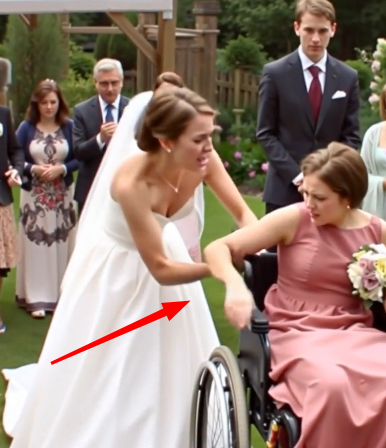My sister called me a “burden,” insisting I disappear from her wedding photos because my

“Matthew, you don’t understand—” Lila stammered, but he cut her off with a sharp wave of his hand.
“No, Lila. It’s you who doesn’t understand. Love isn’t about aesthetics or picture-perfect moments. It’s about acceptance and embracing imperfections,” Matthew said, his voice growing in passion and resolve.
His words echoed through the garden, leaving everyone in stunned silence. The tension was palpable, hanging thick in the air like an approaching storm. I felt my heart pounding in my chest, both in gratitude and fear of what might unfold next.
Lila’s face reddened, her eyes darting around as if searching for an ally among the guests. But all she found were faces of disapproval and shock. The guests, who had been all too eager to capture every moment on their phones, now found themselves turning their cameras and phones towards us, documenting the unexpected turn of events.
In a world that thrived on viral moments, this was one for the ages. Lila had dreamed of her wedding day being memorable, but not like this. As she stood there, unprepared and exposed, the weight of her actions began to visibly sink in.
“I never asked for any of this,” I whispered, breaking the silence. “I just wanted to be there for you, to support you on your special day.”
Matthew turned to me, his eyes softening. “And that’s what family is supposed to be about. Support. Not exclusion.”
The guests began to murmur, a low hum of agreement rippling through the crowd. The videographer, who had been documenting the day, kept the camera rolling. The irony of capturing a genuine, albeit unscripted moment of family drama was not lost on him.
Lila stood there, her carefully constructed world crumbling around her. It was as if the garden itself reacted—clouds drifted over the sun, casting a somber shadow over the proceedings. Her dream wedding was turning into a lesson in humility and acceptance, one that she had never anticipated.
In that moment, I saw a flicker of realization cross her face, a small crack in the hard exterior she had presented. She looked at me, really looked at me, for the first time that day. And in her eyes, I saw the stirrings of regret.
“Maybe… maybe I was wrong,” she finally admitted, her voice barely above a whisper.
Matthew nodded, stepping beside me. “Your sister is not a burden, Lila. She’s a part of your life, just as you are a part of hers. It’s time to celebrate that, not hide from it.”
As the guests absorbed the scene, many began to cheer and clap, turning a moment of conflict into one of solidarity and support. It wasn’t the picture-perfect memory Lila had envisioned, but perhaps it was something better—real, raw, and full of lessons about love and family.
And as the day unfolded, the viral moment that had captured the world’s attention began to reshape itself. No longer was it a tale of exclusion and aesthetics, but a story of redemption and acceptance, one that resonated far beyond the confines of the vintage garden.
In the days to come, as the online world buzzed about the incident, Lila and I began to rebuild our relationship, one conversation at a time. Her wedding, once a day she thought had been ruined, became a catalyst for change—a reminder that love, in all its forms, is the true aesthetic worth cherishing.


